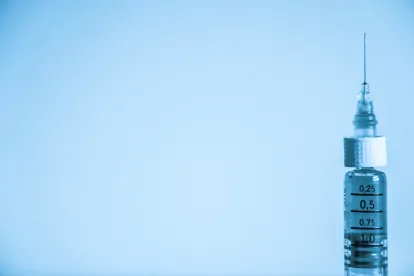Eliminating Kickbacks in Recovery Act Overview
On October 24, 2018, Congress enacted the Eliminating Kickbacks in Recovery Act of 2018 (EKRA) as part of the SUPPORT Act, which is a comprehensive attempt to combat the opioid epidemic. EKRA established an all-payer anti-kickback prohibition that extends to arrangements with recovery homes, clinical treatment facilities, and laboratories. Unlike the Anti-Kickback Statute (AKS) under 42 U.S.C § 1320a-7, EKRA is not limited to services payable by federal health care programs. EKRA applies to all payers. Specifically, EKRA makes it a criminal offense to:
- Solicit or receive any remuneration (including any kickback, bribe, or rebate), directly or indirectly, in return for referring an individual to a recovery home, clinical treatment facility, or laboratory; or
- Offer or pay a kickback to “induce” a referral of an individual to a recovery home, clinical treatment facility, or laboratory, or in exchange for an individual using the services of a recovery home, clinical treatment facility, or laboratory.[1]
Problem 1: Overbroad definition of “laboratory”
While the intent of EKRA was to address the opioid crisis and prevent patient brokering and kickbacks related to substance abuse treatment, the term “laboratory” in EKRA is not limited to just those laboratories associated with substance abuse services. Instead, laboratory is defined under the EKRA statute as “a facility for the biological, microbiological, serological, chemical, immuno-hematological, hematological, biophysical, cytological, pathological, or other examination of materials derived from the human body for the purpose of providing information for the diagnosis, prevention, or treatment of any disease or impairment of, or the assessment of the health of, human beings.”[2] This overbroad definition of “laboratory” does not expressly limit EKRA enforcement to substance abuse-related labs or lab services.
The overbroad definition of “laboratory” to include seemingly all clinical labs may have been an oversight. Congressman Frank Pallone (D) of New Jersey noted EKRA “did not go through regular order and was not properly vetted.” Additionally, he repeated the concerns of others that, “[T]he language of the statute does not do what [Congress] think[s] it does. It may have unintended consequences.”[3] However, no announcements have been made to address these concerns.
Problem 2: EKRA’s safe harbors do not protect conduct permitted under AKS
EKRA has a number of safe harbors similar to those included in AKS:
- Discount or price reduction under a health care benefit program if properly disclosed and appropriately reflected in the costs claimed or charges made by the provider or entity;
- A payment to a bona fide employee or independent contractor, if the payment is not tied to the number of individuals referred, number of tests or procedures performed, or amount billed to or received from the referred individual’s health care benefit program;
- A discount in the price of an applicable drug furnished to an applicable beneficiary under the Medicare coverage gap discount program;
- A payment made as compensation under a personal services and management contract that meets the requirements of 42 C.F.R. § 1001.952(d);
- A waiver or discount of any coinsurance or copayment by a health care benefit program if it is not routinely provided and is provided in good faith;
- Remuneration provided to a federally qualified health center pursuant to an agreement that contributes to the ability of the health center entity to maintain or increase the availability, or enhance the quality, of services provided to a medically underserved population;
- Remuneration made pursuant to an alternative payment model or other payment arrangement that HHS has determined is necessary for care coordination or value-based care; and
- Any other payment, remuneration, discount, or reduction as determined by the attorney general, in consultation with the secretary of HHS, by regulation.[4]
Notable, however, are several differences between EKRA’s safe harbor for employment relationships and its AKS equivalent. First, EKRA exempts certain payments to independent contractors, something AKS does not explicitly do. Second, EKRA does not exempt incentive-based compensation, such as sales commissions, paid to bona fide employees. Incentive-based compensation to employees is permitted under AKS.[5] Instead, EKRA only exempts payment to bona fide employees or independent contractors who do not vary based on:
- The number of individuals referred to a particular recovery home, clinical treatment facility, or laboratory;
- The number of tests or procedures performed; or
- The amount billed to or received from, in part or in whole, the health care benefit program from the individuals referred to a particular recovery home, clinical treatment facility, or laboratory.[6]
As a result, clinical labs that currently operate in compliance with AKS could violate EKRA if they pay their employees on a productivity basis.
Conclusion
EKRA, as written, is not narrowly tailored to address kickback arrangements related solely to recovery homes, treatment facilities, and substance abuse labs as intended by the SUPPORT Act. Absent Congressional amendment, all clinical laboratories are affected by EKRA and need to review their contracts and business arrangements for EKRA compliance. Regardless of clarifying amendments to EKRA, all recovery homes, clinical treatment facilities, and affiliated laboratories should immediately review and revise their contracts and business arrangements to comply with EKRA. An EKRA violation is punishable by fines up to $200,000 and up to 10 years in prison.[7]
[1] H.R. 6878 (Sept. 25, 2018), Sec. 2 (available here: https://www.congress.gov/bill/115th-congress/house-bill/6878/text).
[2] Id.
[3] Find Congressman Pallone’s statements at this link on page H9244: https://www.govinfo.gov/content/pkg/CREC-2018-09-28/pdf/CREC-2018-09-28.pdf.
[4] H.R. 6878 (Sept. 25, 2018), Sec. 2 (available here: https://www.congress.gov/bill/115th-congress/house-bill/6878/text).
[5] See 42 CFR 1001.952(i)
[6] H.R. 6878 (Sept. 25, 2018), Sec. 2 (available here: https://www.congress.gov/bill/115th-congress/house-bill/6878/text).
[7] Id.



 />i
/>i

